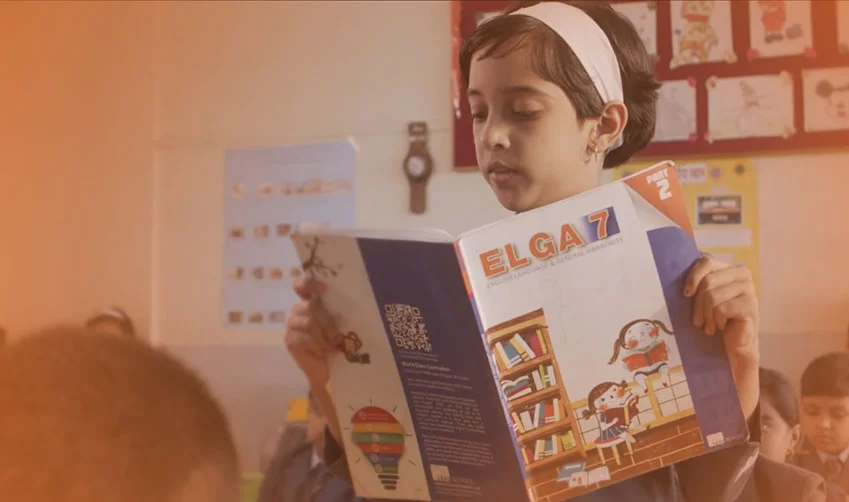How ELGA provides children living in small towns a leg-up?

Give Your School The Lead Advantage
LEAD School’s English Language and General Awareness programme has been specifically designed to bridge the gaps in learning and help students with little organic exposure to the language overcome challenges while picking it up.
Any conversation on education in India always references the vast potential of our young population, and our inability to tap into it due to the imbalances in this sector. The most glaring of these are the gaps between students in urban and rural areas, and even those between students in the bigger cities and the smaller ones.
The absence of the necessary infrastructure and training for teachers are factors in these imbalances but a deeper look at some of the key concepts in learning also explains them.
|
For example, let’s take incidental learning, which is when a child learns through engaging in “real world” activities, tasks, and chores. These could include learning numbers through paying for groceries, or alphabets absorbed from a hoarding. Unlike intentional learning where learning is memorised or rote, incidental learning is an immersive experience that has practical applications, a key reason as to why it is retained for longer. The location of the child makes a huge difference to the kind of incidental learning that takes place. Living in any of India’s bigger cities gives children the benefit of learning the regional language as well as English and/or one or more other languages. This advantage is glaringly absent for children in smaller towns. |
Let’s also look at community learning, which offers multilingual environments to the children, who are able to benefit from being surrounded by parents and others who can show them the way even before traditional schooling begins.
Prepare your students for the future, by partnering with LEAD today. Click here to know more
Factors like these have a substantial although less apparent role in the learning process, and nowhere is this felt more than in the learning of English. Children from metropolitan and Tier I cities have an edge over their counterparts in Tier II and III cities and villages when it comes to learning the English language. But even within metros and cities there is disparity: children from relatively affluent backgrounds in a Tier I city are far more likely to get an opportunity to learn English due to the distribution of schools and exposure.

Many parents instinctively realise this, which is why so many of them aspire to ensure that their children learn English. This plays a major role in the money they spend on education. A study by FSG, titled Understanding the Affordable Private School (APS) Market in India, showed how low-income households in urban India, typically earning between Rs 9,000 and Rs 20,000 a month, spend a disproportionate amount of their income on private sector education. For these families, the affordable private school (APS) segment is the best hope – a chance for their children to significantly improve their standard of living.
The power of incidental and community learning
However, identifying an APS nearby is only the beginning. Children in rural areas and even Tier II, III, and IV towns miss out on incidental and community learning when it comes to English. Parents are often the first teachers and are not able to provide any basic English instruction in such regions; in Tier I cities, children tend to gain an advantage as they imbibe a lot more of the basics of English. Thus, a student from a Tier I city starts off school with a considerable advantage to master English. The learning gap between this student and the one in a small town only grows over the years. Exam-oriented learning and rote learning as opposed to skill-based learning deepens the problem, leaving students without even the fundamental concepts to learn the language.
Clearly there is a pressing need for a decisive intervention at the school level to ensure students from non-metro backgrounds are able to bridge these gaps. It is here that LEAD School’s innovative ELGA (English Language and General Awareness) program offers a comprehensive opportunity to master the English language.
ELGA begins with the simple truth that English is a skill, not a subject and, hence, the focus is not on memorisation but on meeting learning goals The curriculum is modeled on that of Singapore, which is also a multilingual country. However, India presents a much more complicated case due its sheer diversity and the fact that the penetration of English is much lesser than in Singapore.
Why ELGA works

It goes without saying that the ELGA approach cannot succeed without teacher engagement, which is an integral part of LEAD’s methodology. Along with detailed lesson plans and the necessary tools, LEAD’s Academic Excellence teams offer vital feedback to ensure that teachers retain and perfect their skills. A lot of attention is paid to regional diversity and the use of localised techniques, such as the sandwich method. This method incorporates words and sentences from the respective language in the region (eg: Hindi) during the teaching of English so that students are gently eased into English and are able to relate more to the concepts.
The tools and resources provided to LEAD School’s partner schools enable an on-demand method of teaching that is seamless. ELGA is focused on ensuring that teachers have key concepts at their fingertips and that these are not forgotten.
With ELGA, LEAD School has been able to realise one of its central goals: ensuring excellence in English is no longer the preserve of a small elite but is common throughout the country. For, we believe that this level-playing field alone will lead to a profusion of opportunities for every child in India, irrespective of where they live.
Prepare your students for the future, by making your school LEAD powered today. Click here to know more
.png)
.png)
.png)
.png)
